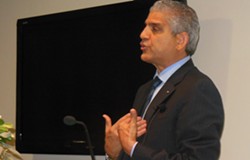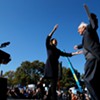click to enlarge 
- Kevin J. Kelley
- Areikat addresses his audience.
As befits a veteran diplomat, the Palestinian Liberation Organization's chief representative to the United States knows how to work an audience.
Maen Rashid Areikat began his speech at Champlain College on Tuesday night by thanking Vermonters for their “warmth of hospitality.” He also showed he'd done some historical homework as he cited Vermont's period as an independent republic committed to democratic rights.
From there, Areikat segued smoothly into his main message to 150 attentive listeners: “My people are fighting for equality, social justice and to live a life of dignity and freedom.”
For the next 40 minutes and during a polite, 30-minute question-and-answer session, he presented a narrative counter to the pro-Israel point of view that he said prevails in the United States. Areikat depicted the Palestinians as victims of relentless and brutal oppression who nevertheless seek a peaceful political resolution to a conflict in which they are a blameless party.
“It is not easy for me to say I'm keeping my hand extended to the Israeli government, the Israeli people,” Areikat said. He suggested that Israel, enabled by the United States, has spurned all efforts by the Palestinians to make peace on the basis of a two-state arrangement.
“Everything they do is aimed at prolonging the occupation,” he complained. He noted that at the start of the peace process 20 years ago there were 150,000 Jewish settlers in the West Bank. Four times as many now live in territory envisioned as the main part of a future Palestinian state, he added.
Israel miscalculates, however, in thinking it can maintain the status quo indefinitely, Areikat cautioned. Today, he said, the Jewish state has a negotiating partner in the PLO that is seeking Palestinian sovereignty on only 22 percent of what he called “historic Palestine”— the land between the Mediterranean and the Jordan River. “I cannot guarantee you that in 10 years we will have a leadership willing to accept that,” Areikat remarked.
Although he pointed out that Hamas is not part of the PLO, the envoy made no criticisms of the militant Islamist group that rules Gaza. The recent warfare with Israel had nothing to do with Hamas' “tunnels and rockets,” Areikat insisted, but was instead the result of Israel's belligerence. He brushed aside an audience member's observation that Hamas is committed to destroying the state of Israel and “killing the Jews.”
Labeling Hamas a terrorist organization — as Israel and the U.S. do — is unhelpful, Areikat suggested. The U.S. had long used that term to describe his own organization, but eventually came to regard the PLO as a moderate force with which it could do diplomatic business, the 54-year-old envoy observed.
Besides, Areikat added, “Western classifications don't fly very much in the Middle East.” It would be fair to refer to the Israeli government as “state terrorists,” given the killing of 2,100 Palestinians in Gaza this summer, but such rhetoric doesn't facilitate peacemaking, Areikat said.
He expressed confidence that Hamas will join in a political dialogue if Israel demonstrates willingness to negotiate meaningfully. “Hamas thrives on opposition, suffering, poverty, lack of services because people are resentful” of living in what Areikat described as “an open-air jail.” If Israel initiates efforts to change those conditions, Hamas will have to adjust its own stand, Areikat predicted.
“It takes two to tango,” in devising a peace settlement, Areikat said, adding later that the solution to the conflict is, “very simple: Live and let live.”
Smiles flickered on a few faces in response to those elocutions. But the event on a drizzly night was not an occasion for mirth. Areikat told no jokes and his hosts — Champlain President Donald Laackman and Mahmoud Jabari, a Palestinian student at the college — remained somber in their introductions.
















































